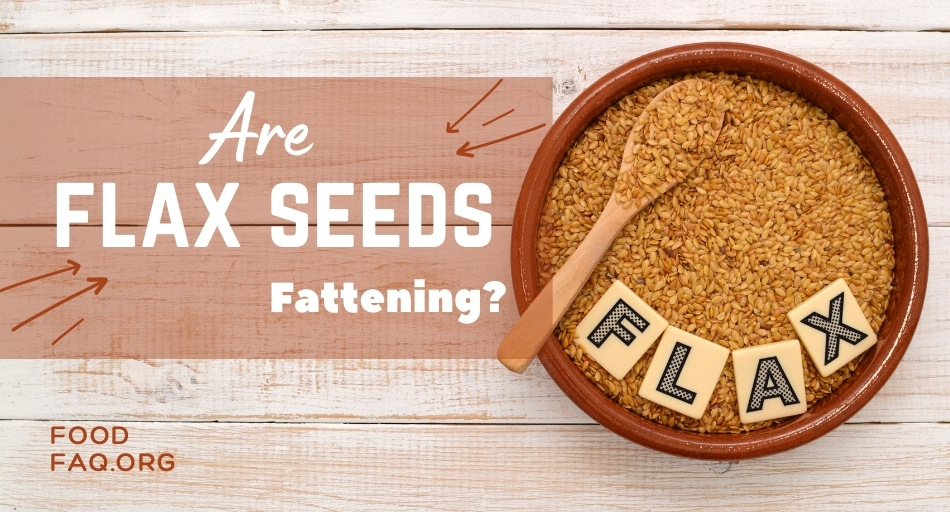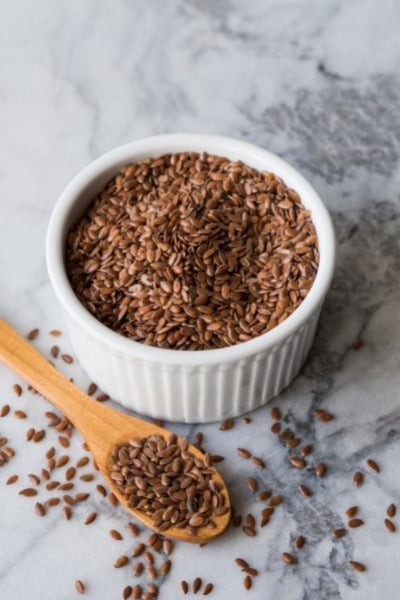Flaxseeds have a mild nutty flavor and can help add crunchiness to your dishes. These small seeds have a wide variety of uses, such as an addition to smoothies, desserts, baked goods, and even sauces.

As you may know, most types of seeds are very high in fat, which might make you wonder whether you should eat them on a weight loss-friendly diet.
So, are they safe to eat when you’re trying to lose weight? Are flaxseeds fattening?
Table of Contents
Are flaxseeds fattening?
Flaxseeds are high in calories, but they mostly come from healthy fats and fiber. As a result, if you’re trying to shed some pounds, adding small amounts of flaxseeds to your diet can be a great idea.
What’s more, flaxseeds are loaded with important nutrients, minerals, and vitamins that contribute to your overall health, aiding in your weight loss journey even more.
How many calories are in flaxseeds?
A one-ounce serving of flaxseeds contains around 150 calories. Most of those calories come from fat and healthy carbs.
While this might seem like a large number of calories, flaxseeds actually contain lots of beneficial compounds and nutrients.
So, if you eat them in moderation and as part of a healthy, balanced diet, you can lose weight by adding them to your meals.

Are flaxseeds good for you?
Although high in calories and fat, the fat in flaxseeds actually has many wonderful health benefits.
The type of fat found in flaxseeds is primarily omega-3 fatty acids, which can help protect your heart from various diseases.
For example, this type of fat helps reduce inflammation and lower the levels of ‘bad’ cholesterol in your blood and heart’s blood vessels.
This, in turn, helps prevent narrowed arteries and type 2 diabetes from developing. So, eating flaxseeds can help fight against these issues.
Flaxseeds also provide you with a great dose of magnesium, almost 30% of your daily recommended need for this mineral.
Magnesium is involved in a wide variety of biochemical reactions in your body. It also contributes to your heart health, lowering the risk of cardiovascular issues like heart attacks and high blood pressure.
In addition, magnesium boosts exercise performance and may even combat some symptoms of depression. As you can see, including magnesium-rich foods in your diet is essential.

Some studies also show that eating flaxseeds can help prevent certain types of cancer from developing.
This is because flaxseeds are high in antioxidants, which flush out free radicals from your body, preventing oxidative stress and damage to your cells.
Oxidative stress is linked to a higher risk of various health conditions, including heart disease, diabetes, chronic inflammation, and cancer.
As a result, eating antioxidant-rich foods like flaxseeds is very important.
One ounce of flaxseeds contains 7.6 g of fiber, which is a lot for such a small serving. This fiber not only helps you stay full after eating but can also reduce acid reflux symptoms by soaking up excess stomach acid.
Additionally, the fiber found in flaxseeds can help stabilize your blood sugar levels, preventing diabetes and slowing down the absorption of sugar.
This also contributes to good health and weight management, making flaxseeds a very healthy food.
Should you eat flaxseeds when trying to lose weight?
Adding flaxseeds to a weight loss-friendly diet is beneficial in several ways. First of all, a single one-ounce serving of these seeds provides you with 31% of your daily need for fiber – more than most other types of seeds.
Fiber is essential in helping food travel through your digestive tract, ensuring good digestion and preventing stomach problems.

It also helps you feel full, lowering your appetite and reducing the number of calories you’re taking in.
So, adding high-fiber foods like flaxseeds to a low-calorie diet is a great idea.
Flaxseeds are also packed with omega-3 fatty acids. These not only have wonderful health benefits, such as reduced inflammation, autoimmune disease prevention, and lower risk of certain types of cancer, but they can also help with weight loss.
Studies show that omega-3 fatty acids make weight loss easier by contributing to the feeling of fullness and keeping your digestive system healthy.
So, any omega-3 fatty acids-rich food can help you drop some pounds.
Above all that, flaxseeds contain a special plant compound called lignin. It’s found in the cell walls of many plants, including flaxseeds.
Lignin has many health benefits, such as lower blood pressure, but can also aid in weight loss. Studies believe that it can be due to the high antioxidant content of flaxseeds, which are also present in lignin.
So, aside from the nutrients they contain, flaxseeds have many more benefits for weight management.
Is flaxseed oil fattening?
Flaxseed oil contains around the same number of calories as the traditional vegetable oil, 119 calories per one tablespoon.
It might contain slightly more vitamin E than the commonly used variety of oil, but it’s still highly caloric.
It also has a different taste, so make sure you keep that in mind before cooking with it.

Is flaxseed flour fattening?
Flaxseeds flour is about as caloric as other types of flour. Two tablespoons of this flour contain 69 calories.
But as opposed to other flours, flaxseeds flour contains more fiber and minerals like calcium, iron, and potassium.
It’s also lower in carbohydrates, which means that you’re more likely to stay fuller after eating.
In addition, some studies show that adding flaxseed flour to your diet can help with weight loss and lipid profile in obese adults.
Because of that, switching to flaxseed flour can be helpful if your goal is to lose weight.
Conclusion
Flaxseeds might be rather caloric, but it doesn’t mean that eating them won’t lead to weight loss.
They are rich in various nutrients, minerals, and vitamins that all help you shed pounds. Flaxseeds are also delicious and easy to add to any diet, making them very versatile.
So, whether you’re eating raw flaxseeds or using supplements, adding these small, nutrient-rich seeds can be beneficial for healthy weight loss.
